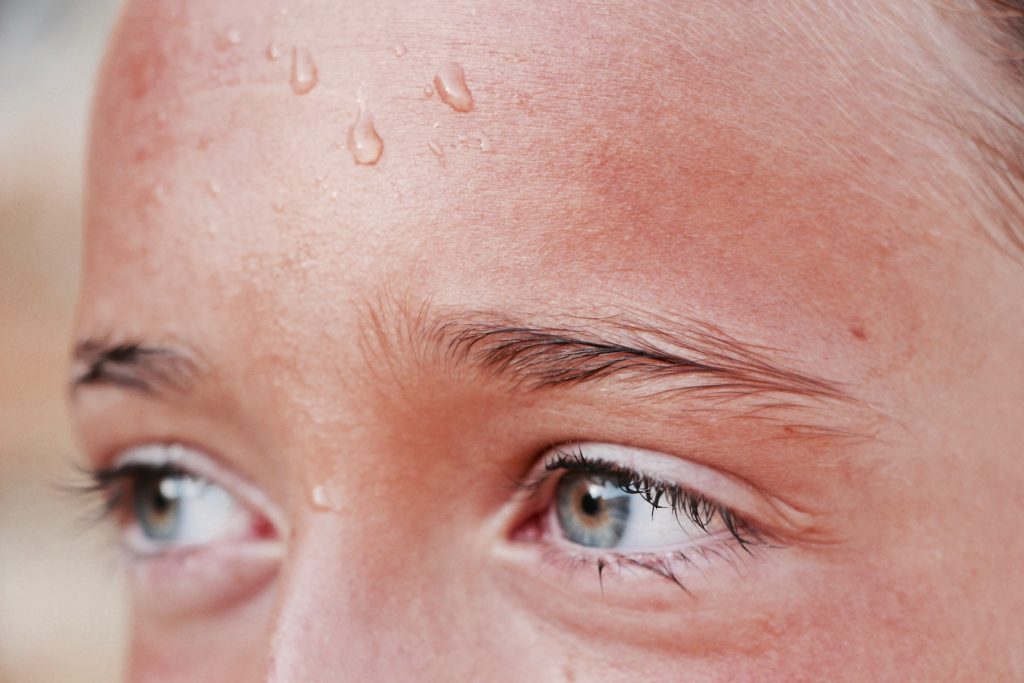Have you ever wondered about the intricate dance happening on your skin when you’re exerting yourself or feeling the heat? It’s the incredible phenomenon of sweat, a natural and vital process that plays a crucial role in regulating your body temperature. Join us on a journey through the fascinating world of sweat, exploring why we produce it, the science behind its occurrence, its surprising health benefits, and the best ways to keep it under control.

Why Do We Produce It?
Sweating is your body’s ingenious way of keeping cool when things heat up. As you engage in physical activity or face a rise in temperature, your brain sends signals to the 2 to 4 million sweat glands scattered across your body. These glands, particularly concentrated in areas like your forehead, armpits, and palms, kick into action, releasing a watery mixture onto your skin’s surface.
How Does Sweating Happen?
Sweat itself is primarily composed of water, but it also contains electrolytes like sodium and small amounts of other substances. When the sweat reaches your skin, it evaporates due to body heat, creating a cooling effect. This process helps maintain your body temperature within the optimal range, preventing overheating, and allowing you to push your physical limits.

Beyond Temperature Regulation
While the primary function of sweating is thermoregulation, its benefits extend beyond cooling down. Here’s a glimpse of the health perks associated with this natural bodily function:
1. Detoxification
Sweating aids in flushing out toxins from your body. The process opens up your pores, allowing impurities to be expelled, contributing to clearer and healthier skin.
2. Immune System Boost
Sweat contains antimicrobial peptides that exhibit germ-fighting properties. This can provide an additional layer of defense for your immune system.
3. Stress Reduction
Engaging in activities that induce sweating, such as exercise, prompts the release of endorphins – the feel-good hormones. This not only helps in stress reduction but also contributes to an improved mood.
4. Weight Loss Support
Sweating during physical activity indicates increased calorie expenditure. While it doesn’t directly equate to fat loss, it is a sign that your body is working hard, which can contribute to overall weight management.
Tips for Managing Sweating
While sweating is a natural and beneficial process, there are instances where you might want to keep it in check. Whether it’s a desire to stay dry during a presentation or avoid sweat-induced chafing during a workout, here are some tips for managing excessive sweating:
1. Choose Breathable Fabrics
Opt for clothing made from natural, breathable fabrics like cotton. These materials allow better air circulation, reducing the likelihood of sweat becoming trapped against your skin.
2. Stay Hydrated
Proper hydration can help regulate your body temperature more effectively. When your body is well-hydrated, it can sweat more efficiently.
3. Use Antiperspirants
Antiperspirants work by blocking sweat glands temporarily, reducing the amount of sweat that reaches the skin’s surface. Look for products containing aluminum-based compounds for effective results.
4. Shower Regularly
Maintaining good personal hygiene, including regular showers, helps keep bacteria in check and minimizes body odor associated with sweating.
5. Consider Clinical Solutions
For individuals dealing with hyperhidrosis (excessive sweating), clinical interventions like Botox injections, prescription antiperspirants, or even surgical options may be considered. Consultation with a healthcare professional is advisable in such cases.

Sweat, often dismissed as a mere inconvenience, emerges as a hero in the narrative of our well-being. It’s a testament to our body’s remarkable ability to adapt and thrive. So, the next time you feel those tiny beads forming on your skin, embrace the liquid gold, for it signifies a body working in harmony, keeping you cool, detoxified, and ready to conquer life’s challenges. After all, in the symphony of bodily functions, sweat takes center stage as the maestro of temperature regulation and holistic health.





